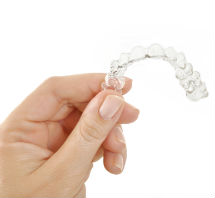Night Guards

The involuntary tooth-clenching action associated with bruxism can cause a myriad of problems including headaches, tooth sensitivity, excessive wear and tear, chipped teeth, tooth erosion and TMJ. TMJ is a condition marked by the uncomfortable ability of the lower jaw (the mandible) to move up, down and sideways. It is not uncommon for professional dental care providers to fit patients with mouth guards to hold a jaw steady during slumber in order to increase comfort and reduce the negative impact of the conditions.
Mouth guards (in the form of trays) are also used in cosmetic dentistry. Some trays are used to hold the solution needed for professional tooth bleaching. Additionally, the new crop of invisible braces count on removable and replaceable mouth guards to slowly shift teeth into their proper positions.
